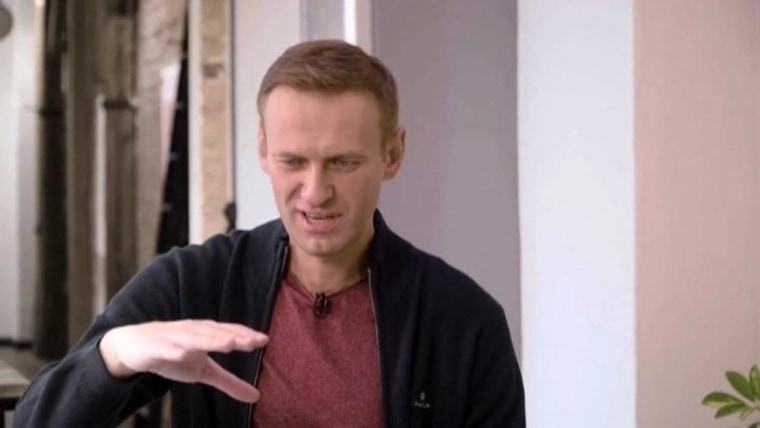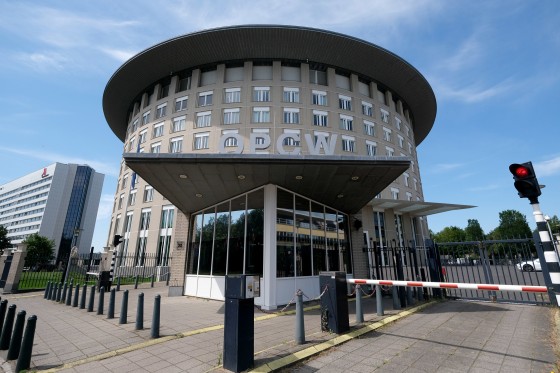The Kremlin strongly denied Russia was developing new chemical weapons Wednesday after the global chemical weapons watchdog said Kremlin critic Alexei Navalny was poisoned with a previously undeclared variant of a Soviet-era nerve agent.
The Organisation for the Prohibition of Chemical Weapons (OPCW) said in a statement Tuesday that biomarkers in Navalny's samples had “similar structural characteristics as the toxic chemicals belonging” to the Novichok group.
The exact substance in Navalny’s samples was not on OPCW’s list of banned chemical weapons, the statement said.
A Soviet-era nerve toxin, the British government said Novichok was also used to poison former Russian spy Sergei Skripal and his daughter Yulia in Salisbury, England in 2018.
One of Navalny’s associates, Leonid Volkov, said in a post on messaging app Telegram on Tuesday that the OPCW's findings raise the possibility that Russia is actively developing new chemical weapons.
“Today’s press release from the OPCW practically confirms that right now, in 2020, Russia has an active program to develop new chemical warfare agents of the Novichok group, which is the wildest violation of all possible and impossible international norms and conventions,” he said.

Asked about the allegations, Kremlin spokesman Dmitry Peskov said Russia is a participant in the convention on the prohibition of chemical weapons.
"The Russian Federation has fulfilled all of its obligations under this convention, so this is out of the question," Peskov added.
The OPCW's findings follow results released by the German government last month, suggesting Navalny was poisoned by an agent from the Novichok family. Navalny was airlifted to Germany after falling ill on a plane in Russia in August. He received treatment there and is currently in rehabilitation.
Reacting to the OPCW’s report, the German government said Tuesday it once again confirmed “the unequivocal evidence that Alexei Navalny was the victim of an attack with a chemical nerve agent from the Novichok group.”
“This publicly unknown nerve agent has, to date, not been officially listed by the OPCW,” the government’s statement said.
Marc-Michael Blum, an independent chemical disarmament consultant and former head of the OPCW laboratory, told NBC News it's difficult to say with any certainty whether Russia is developing new chemical weapons, even if the variant of the Novichok detected in Navalny's samples was not previously listed by the OPCW.
There are many structural variations within the Novichok group, Blum said, and the Soviet Union likely tested hundreds, if not thousands, of variants that are still not listed by the OPCW.
“They could have re-purified an old stock or they might have made it new,” Blum said. “Simply from the biomedical samples of Navalny, you can’t deduce any kind of source. All they can really do is prove the exposure.”
Download the NBC News app for the latest news on the coronavirus
Germany has repeatedly called on the Kremlin to investigate and explain how Navalny was poisoned, but Russia has denied involvement and is still questioning whether Navalny was in fact poisoned.
“The strategic question is if this is a new and different Novichok, do the Russians still have a chemical weapons program, and if so, are they developing it?" Hamish de Bretton-Gordon, chemical weapons expert and author of “Chemical Warrior: Syria, Salisbury and Saving Lives at War,” said. "If that is the case, it’s massive."
Russia said it destroyed its last supplies of chemical weapons in 2017, an achievement hailed by President Vladimir Putin as “a historic event” at the time.
“Since then, we have seen the Salisbury attack and now the Navalny attack where the most deadly chemical weapon ever developed, Novichok, was used,” De Bretton-Gordon said. “This is not only a crime against humanity but it’s illegal under every chemical weapons convention.”
He has called on the U.N. Security Council to fully investigate Navalny’s poisoning.
“World wars have started for less than this, and I am not saying this is going to happen, but it’s something that the U.N. and the international community need to take very seriously and not fob it off under the guise of Covid-19 and the U.S. election,” De Bretton-Gordon added.
Navalny’s poisoning has further escalated tensions between Moscow and the west, with growing calls for a new set of sanctions against Russia.
German foreign minister Heiko Maas said Wednesday they are working on a "joint reaction" with partners in the E.U. and the OPCW, saying "a severe breach of international law committed with a chemical nerve agent" cannot remain without consequences.

